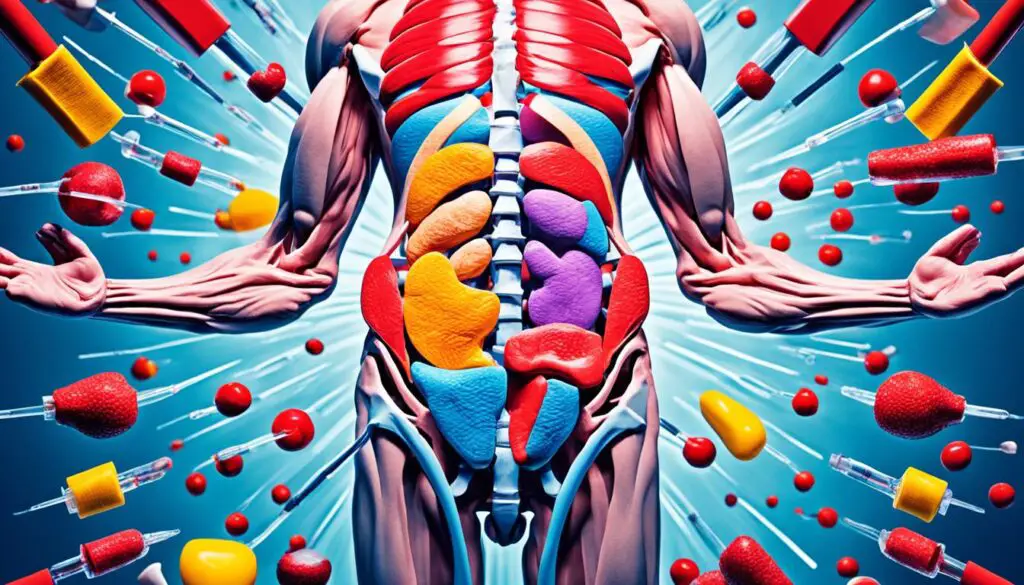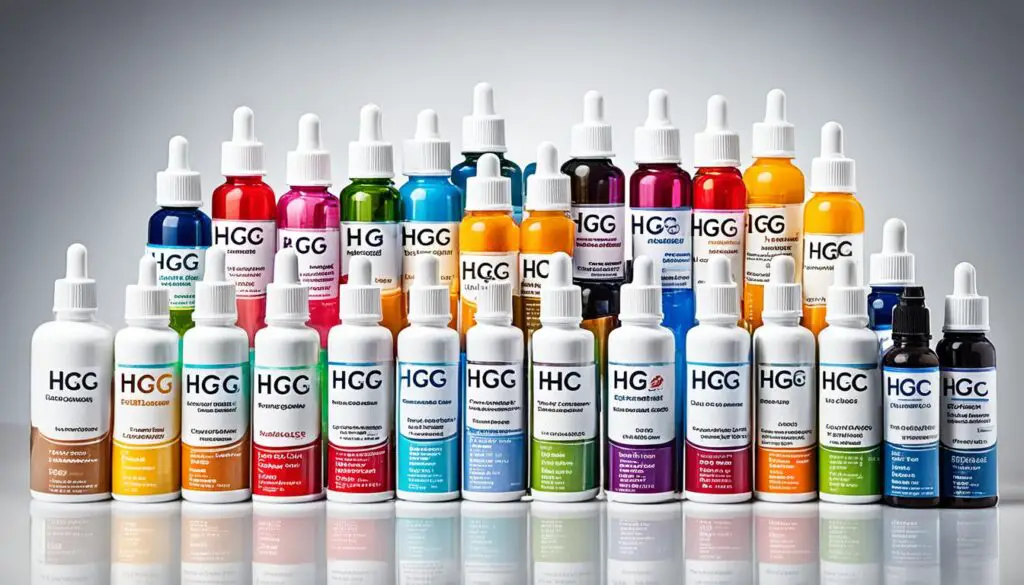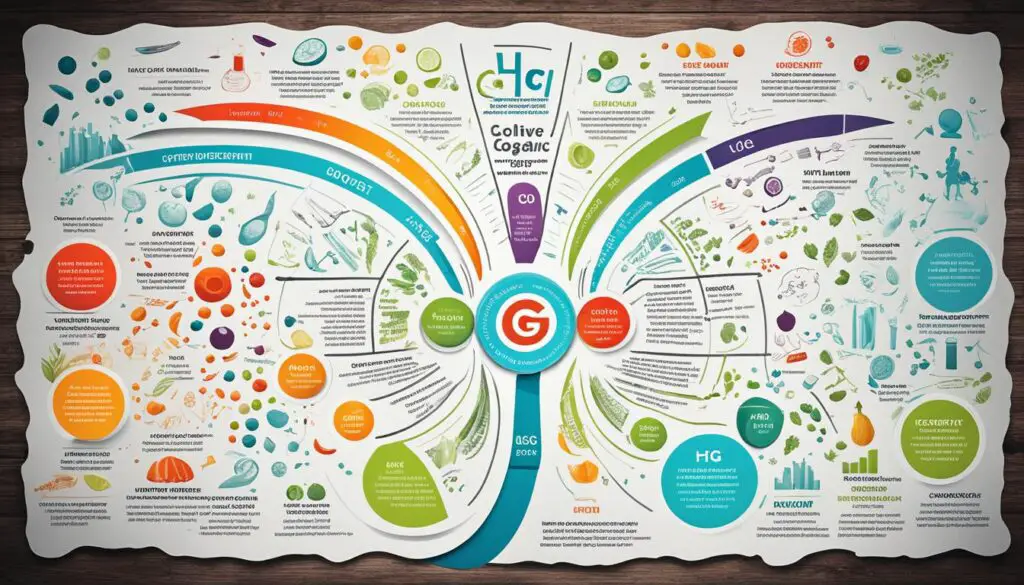Did you know that the HCG diet, a popular weight loss approach, has a significant impact on metabolism? Although its effects may seem promising, it is crucial to examine both the benefits and risks associated with this diet. In this article, I will delve into the science behind the HCG diet and its effects on metabolism, providing a comprehensive understanding of its potential impact on your weight loss journey.
Key Takeaways:
- The HCG diet is a weight loss approach that combines HCG hormone injections with a very low-calorie diet.
- While proponents claim that the HCG diet boosts metabolism and promotes fat loss, scientific evidence does not support these claims.
- Extreme calorie restriction, rather than the HCG hormone itself, primarily contributes to weight loss on the HCG diet.
- The HCG diet poses safety concerns, including the risk of gallstones, electrolyte imbalances, and potential increase in cancer risk.
- Safer and more sustainable methods for weight loss include following a balanced diet and engaging in regular exercise.
What is the HCG Diet?
The HCG diet is a popular weight loss approach that involves a combination of HCG hormone injections and an ultra-low-calorie diet. The HCG hormone, which is naturally produced during pregnancy, is believed to regulate hormonal functions in the body.
The diet consists of three phases: the loading phase, the weight loss phase, and the maintenance phase. During the loading phase, individuals are encouraged to consume high-calorie foods to build up fat stores. The weight loss phase is characterized by a strict daily calorie intake of around 500 calories, accompanied by HCG hormone injections. This phase typically lasts for several weeks. In the maintenance phase, individuals gradually reintroduce more calories and food options into their diet.
The HCG diet restricts individuals to two meals per day, usually lunch and dinner, with specific food portions and choices. The diet emphasizes lean protein sources, such as chicken and fish, along with a limited selection of vegetables and fruits. Processed and high-carbohydrate foods are generally avoided.
The HCG diet gained popularity due to claims that it promotes rapid weight loss and targets stored fat rather than muscle mass. However, it is important to note that scientific evidence supporting these claims is limited. It is crucial to approach the HCG diet with caution and under medical supervision to ensure safety and effectiveness.
Does HCG Boost Metabolism?

While proponents of the HCG diet claim that it boosts metabolism and promotes fat loss while preserving muscle mass, scientific evidence does not support these claims. Studies have shown that weight loss achieved on the HCG diet is primarily due to the extreme calorie restriction, not the HCG hormone itself. The diet may lead to muscle loss and a slowdown in metabolism, making it difficult to maintain weight loss in the long term.
Scientific evidence does not support claims that HCG boosts metabolism. The weight loss achieved on the HCG diet is primarily due to extreme calorie restriction, not the HCG hormone itself.
Some proponents of the HCG diet argue that the hormone stimulates the body to burn stored fat for energy, resulting in increased metabolism and fat loss. However, studies have found that weight loss on the HCG diet is primarily a result of the severely restricted calorie intake, typically around 500 calories per day.
“The weight loss achieved on the HCG diet can be attributed to calorie restriction rather than any metabolic effects of the HCG hormone.”
When the body is subjected to such an extreme calorie deficit, it turns to its fat stores for energy, resulting in weight loss. However, this process also leads to the breakdown of muscle tissue, which can further slow down the metabolism.
While some individuals may experience initial weight loss on the HCG diet, it is challenging to sustain these results in the long term. The severe calorie restriction, combined with muscle loss, can lead to a reduced metabolic rate. This slowdown in metabolism makes it difficult to maintain weight loss once the diet is discontinued and regular eating habits are resumed.
Moreover, the HCG diet does not address the underlying factors that contribute to weight gain, such as unhealthy eating habits and lack of physical activity. For long-term success in weight management, it is crucial to adopt sustainable lifestyle changes that include a balanced diet and regular exercise.
Summary:
- Scientific evidence does not support claims that HCG boosts metabolism.
- Weight loss achieved on the HCG diet is primarily due to extreme calorie restriction.
- The HCG diet may lead to muscle loss and a slowdown in metabolism.
- Long-term weight loss maintenance can be challenging with the HCG diet.
- Adopting a balanced diet and regular exercise are essential for sustainable weight management.
How Does HCG Impact Fat Metabolism?
HCG injections play a role in impacting fat metabolism by signaling the body to release stored fat into the bloodstream for energy. This process enables individuals on the HCG diet to actively burn stored fat and facilitate weight loss. However, it is important to note that the weight loss achieved through fat metabolism on the HCG diet is primarily due to the extreme calorie restriction rather than the HCG hormone itself.
The Role of HCG in Fat Metabolism
When individuals receive HCG injections, the hormone stimulates the release of stored fat from adipose tissue, which is then transported into the bloodstream. This released fat is utilized by the body as an energy source during the period of extreme calorie restriction on the HCG diet.
By utilizing this stored fat as an energy source, individuals can experience significant weight loss. However, it is important to remember that the weight loss achieved through fat metabolism is a result of the overall calorie deficit created by the restrictive diet. The HCG hormone acts as a catalyst in this process, but it is not the primary driver of weight loss.
It’s also worth noting that while the HCG diet may promote fat burning, it may also lead to muscle loss as a result of the calorie restriction. Losing muscle mass can potentially slow down the overall metabolism, making it challenging to sustain weight loss in the long term.
The Importance of Calorie Restriction
The success of the HCG diet lies in the combination of HCG injections and severe calorie restriction. By following an ultra-low-calorie diet, typically around 500 calories per day, individuals create a significant caloric deficit, leading to weight loss.
The extreme calorie restriction forces the body to utilize stored fat as an energy source, resulting in fat metabolism. While HCG injections may enhance this process, it is crucial to understand that the calorie restriction is the primary factor responsible for the weight loss achieved on the HCG diet.
Comparing Calorie Restriction and HCG Hormone Impact on Fat Metabolism
| Calorie Restriction | HCG Hormone | |
|---|---|---|
| Primary Factor | ✓ | ✘ |
| Impact on Weight Loss | Significant | Enhanced |
| Potential for Muscle Loss | ✓ | ✘ |
| Long-Term Sustainability | Challenging | Challenging |
As seen in the table above, while the HCG hormone may enhance fat metabolism, the primary factor in weight loss is the severe calorie restriction. Additionally, both calorie restriction and HCG injections can potentially lead to muscle loss and present challenges in maintaining weight loss in the long term.
Safety Concerns of the HCG Diet

The HCG diet raises significant safety concerns that should not be overlooked. The Food and Drug Administration (FDA) considers this diet unsafe due to its extreme calorie restriction and the use of unregulated HCG products. It is important to be aware of the potential side effects and risks associated with the HCG diet.
Fatigue and Irritability
The severe calorie restriction on the HCG diet can lead to fatigue and irritability. With such a restricted intake of calories, the body may not receive enough energy to function optimally, resulting in these undesirable symptoms.
Depression and Emotional Changes
Another side effect of the HCG diet is depression and emotional changes. The severe calorie restriction may impact mood and overall emotional well-being. It is essential to consider the potential impact on mental health when exploring weight loss options.
Fluid Buildup
One of the side effects associated with the HCG diet is fluid buildup. The body may start retaining water due to the drastic change in food intake, leading to bloating and discomfort.
Risk of Blood Clots
Individuals on the HCG diet are at an increased risk of blood clots. The combination of severe calorie restriction and fluctuating hormone levels can contribute to blood clot formation, which can be dangerous and life-threatening.
It is crucial to note that HCG weight-loss products are not approved for over-the-counter use and are considered illegal. The lack of regulation and monitoring increases the potential risks associated with these products.
Before starting any weight loss program, it is highly recommended to consult with a healthcare professional to assess the potential risks and side effects. They can provide personalized guidance and help determine safer alternatives for achieving your weight loss goals.
It is important to prioritize your health and well-being when considering weight loss methods. The safety concerns and potential risks associated with the HCG diet make it crucial to explore safer alternatives that promote long-term health and sustainable weight loss.
Effectiveness of the HCG Diet
When considering weight loss options, it’s important to assess the effectiveness of different diet plans. The HCG diet, with its combination of HCG hormone injections and severe calorie restriction, has gained attention for its potential weight loss results. However, it’s crucial to examine the evidence behind its effectiveness.
While the HCG diet may lead to short-term weight loss, primarily due to the extreme calorie restriction, there is no scientific evidence to support its long-term effectiveness. The weight loss achieved on the HCG diet is primarily a result of calorie restriction, rather than any unique properties of the HCG hormone itself. Safer and more sustainable methods of weight loss should be considered for optimal results.
It is important to note that weight loss achieved through extreme calorie restriction can have negative implications for overall health. The severe restriction of necessary nutrients can lead to nutrient deficiencies and potential adverse effects on the body.
“While some individuals may experience short-term weight loss on the HCG diet, the lack of scientific evidence supporting its long-term effectiveness suggests that safer and more sustainable weight loss methods should be considered.”
Instead of relying on the HCG diet, it is advisable to focus on a balanced diet that includes all essential nutrients and is appropriate in calorie intake. Combined with regular exercise, this approach promotes healthy weight loss and long-term weight management.
HCG Diet Products on the Market

When browsing for HCG diet products, it’s crucial to be aware of the different options available and their potential effects. Many products labeled as homeopathic HCG do not actually contain real HCG hormone. These homeopathic HCG products are typically unregulated and may contain unknown ingredients, making it difficult to determine their safety and efficacy.
Only HCG injections, administered through a doctor’s prescription, can raise blood levels of HCG and potentially impact weight loss. It is important to consult a healthcare professional who can provide guidance based on your individual needs and health status.
The Real Deal: HCG Injections
HCG injections, when obtained legally and administered under medical supervision, are the only form of HCG that deliver the hormone directly into the bloodstream. By raising blood levels of HCG, these injections may have the potential to affect metabolism and contribute to weight loss.
To ensure safety and effectiveness, it is essential to consult a healthcare professional or a reputable medical clinic that specializes in HCG injections. They can guide you through the process, provide personalized advice, and monitor your progress to ensure your weight loss journey is both safe and successful.
| Product Type | Description |
|---|---|
| HCG Injections | HCG injections are administered through a doctor’s prescription. They contain real HCG hormone and are the only form that can potentially impact weight loss. |
| Homeopathic HCG Products | These products are labeled as homeopathic but do not contain real HCG hormone. They are unregulated and may contain unknown ingredients. |
Side Effects and Risks of the HCG Diet

The HCG diet, although touted as a weight loss solution, comes with its fair share of side effects and risks. It’s important to be aware of these potential consequences before embarking on the HCG diet journey.
Headaches and Fatigue
One of the common side effects reported by individuals on the HCG diet is headaches, often attributed to the severely restricted calorie intake. This extreme calorie restriction can also result in fatigue and low energy levels, making it difficult to carry out daily activities.
Depression and Emotional Instability
The HCG diet’s rigorous calorie restriction can have an impact on your emotional well-being. Many individuals have reported experiencing mood swings, depression, and increased irritability while on the diet. The hormonal changes resulting from the diet may contribute to these emotional fluctuations.
“While on the HCG diet, I found myself feeling constantly low and irritable. It was a challenging time emotionally, and I struggled to maintain a positive mindset.” – Sarah, former HCG diet follower
Risk of Blood Clots
An increased risk of blood clots is another concern associated with the HCG diet. The combination of hormonal changes, severe calorie restriction, and rapid weight loss may contribute to blood clot formation. This poses a serious health risk and should not be taken lightly.
Nutrient Deficiencies and Electrolyte Imbalances
The strict limitations on food intake during the HCG diet can lead to nutrient deficiencies and electrolyte imbalances. With a limited variety of allowed foods, it can be challenging to consume all the necessary nutrients for optimal health. Additionally, electrolyte imbalances can arise due to the diuretic effects of the diet, which may disrupt the body’s natural balance.
“I experienced significant muscle cramps and weakness during my time on the HCG diet. It was later discovered that I had an electrolyte imbalance due to the strict diet restrictions.” – Mark, former HCG diet follower
It is crucial to consult with a healthcare professional before commencing the HCG diet to fully understand the potential risks and side effects it may present. They can provide personalized guidance and help you make an informed decision about whether the HCG diet is suitable for you.
Safer Alternatives for Weight Loss

When it comes to achieving weight loss goals, it’s important to prioritize safety and sustainability. While the HCG diet might promise quick results, it’s crucial to consider safer alternatives that promote long-term health and well-being. By adopting a balanced diet and incorporating regular exercise into your lifestyle, you can achieve weight loss in a way that is both effective and healthy.
A balanced diet is key to providing your body with the nutrients it needs while still promoting weight loss. Focus on consuming a variety of whole foods, such as fruits, vegetables, lean proteins, whole grains, and healthy fats. Avoid restrictive diets that severely limit calorie intake, as they can lead to nutrient deficiencies and other health complications.
In addition to a balanced diet, regular exercise plays a vital role in weight loss. Engaging in physical activity not only burns calories but also helps to build muscle, boost metabolism, and improve overall fitness. Aim for a combination of cardiovascular exercises, such as running or swimming, and strength training exercises, such as weightlifting or bodyweight exercises, for optimal results.
By adopting these safer weight loss methods, you can achieve your desired weight loss goals while also improving your overall health and well-being. Remember, it’s important to consult with a healthcare professional or registered dietitian before starting any new weight loss program to ensure it is safe and suitable for your individual needs.
Benefits of Safer Weight Loss Methods
Switching to a safer weight loss approach offers various benefits:
- Long-term sustainability
- Improved overall health
- Reduced risk of nutrient deficiencies
- Increased energy levels
- Enhanced mood and mental well-being
- Improved physical fitness and strength
Comparison Table: HCG Diet vs. Safer Alternatives
| HCG Diet | Safer Alternatives | |
|---|---|---|
| Effectiveness | Short-term weight loss due to severe calorie restriction* | Long-term weight loss through healthy habits* |
| Safety | Associated with risks and side effects* | Safer and approved by healthcare professionals* |
| Sustainability | Difficult to maintain after diet cessation* | Can be sustained as a lifestyle* |
| Overall Health | May lead to nutrient deficiencies and imbalances* | Promotes overall health and well-being* |
Choose an approach to weight loss that not only helps you shed the pounds but also supports your overall health and well-being. Embrace a balanced diet and regular exercise as the cornerstones of your weight loss journey, and consult with a healthcare professional for personalized guidance and support.
Consultation for HCG Injections
If you are considering HCG injections as part of your weight loss journey, it is crucial to seek professional consultation and medical supervision. Consulting with a healthcare professional or a reputable medical clinic will ensure that you receive personalized guidance and support throughout the HCG diet process.
During the consultation, the healthcare professional will provide you with important information about the HCG diet, including its benefits, risks, and potential side effects. They will assess your medical history, current health status, and weight loss goals to determine whether the HCG diet is suitable for you.
The healthcare professional will also guide you on the proper administration of HCG injections, ensuring that you understand the correct dosage and technique. They will monitor your progress closely and make any necessary adjustments to your treatment plan, ensuring your safety and wellbeing.
By undergoing a consultation for HCG injections, you will receive personalized advice that takes into account your unique circumstances and needs. This level of medical supervision throughout the HCG diet journey is essential for achieving safe and effective weight loss results.
Why Consultation and Medical Supervision Matter
Seeking consultation and medical supervision for HCG injections is crucial for several reasons:
- Personalized Advice: A healthcare professional can tailor the HCG diet to your individual needs, ensuring it is safe and effective for you.
- Monitoring and Progress Evaluation: Regular check-ups and monitoring during the HCG diet will help track your progress and identify any potential issues or concerns.
- Safe Administration: Proper administration of HCG injections requires guidance and supervision to minimize the risk of complications or errors.
- Addressing Side Effects: Any potential side effects or adverse reactions can be quickly identified and managed under medical supervision.
- Long-term Health Considerations: A healthcare professional can assess the long-term impact of the HCG diet on your overall health and provide guidance for maintaining weight loss after the diet.
Remember, the HCG diet may not be suitable for everyone, and consultation with a healthcare professional will help determine if it is the right approach for you. Prioritizing your health and safety throughout your weight loss journey is essential, and professional guidance can provide you with the necessary support and expertise.
Consulting with a healthcare professional or reputable medical clinic is crucial to ensure personalized advice, monitoring, and support during your HCG diet journey.
Book a consultation with a healthcare professional experienced in HCG diet protocols to embark on your weight loss journey with confidence and peace of mind.
Benefits and Limitations of HCG Injections
When considering weight loss options, some individuals turn to HCG injections for their perceived benefits. These injections may offer short-term weight loss benefits, making them an attractive choice for those seeking quick results. The HCG hormone is believed to impact fat metabolism and promote the release of stored fat for energy, which can aid in weight loss.
However, it is important to acknowledge the limitations of the HCG diet. While the short-term benefits may seem appealing, there are potential risks and side effects associated with this approach. The severe calorie restriction required by the diet can lead to tiredness, irritability, and other unfavorable symptoms. It may also result in nutrient deficiencies and electrolyte imbalances.
Another limitation of the HCG diet is the lack of scientific evidence supporting its long-term effectiveness. While some individuals may experience initial weight loss, maintaining that weight loss over time can be challenging. Additionally, the strict calorie restriction necessitated by the HCG diet can be difficult to sustain in the long run.
To ensure safety and maximize the potential benefits of HCG injections, it is crucial to approach this diet with caution and under medical supervision. Consulting with a healthcare professional can help individuals understand the potential risks and side effects, as well as provide guidance throughout their weight loss journey.
In conclusion, while HCG injections may offer short-term weight loss benefits, it is important to consider the limitations of the HCG diet. The potential risks and side effects, the need for strict calorie restriction, and the lack of long-term scientific evidence should all be taken into account. It is advisable to explore safer and more sustainable methods of weight loss, such as following a balanced diet and engaging in regular exercise.
Conclusion
After examining the effects and safety concerns of the HCG diet, it is clear that while it may lead to short-term weight loss, it is not a safe or sustainable long-term solution. The extreme calorie restriction recommended by the diet poses risks to overall health, including gallstone formation and electrolyte imbalances, and there is no scientific evidence to support the long-term effectiveness of the diet.
Instead, I recommend considering safer methods for weight loss, such as following a balanced diet and incorporating regular exercise into your routine. These methods promote healthy and sustainable weight loss while prioritizing overall health. It is crucial to consult with a healthcare professional before starting any weight loss program to ensure safety and personalized guidance throughout your journey.
In conclusion, the HCG diet may offer short-term benefits, but it is important to weigh these against the potential risks and lack of long-term effectiveness. Prioritizing your health and choosing safer alternatives for weight loss will provide you with sustainable results and support your overall well-being.
FAQ
How does the HCG diet impact metabolism?
The HCG diet has not been proven to boost metabolism. The weight loss achieved on the HCG diet is primarily due to the extreme calorie restriction, rather than the HCG hormone itself.
What is the HCG diet?
The HCG diet is a weight loss approach that involves a combination of HCG hormone injections and a very low-calorie diet of around 500 calories per day.
Does HCG boost metabolism?
There is no scientific evidence to support the claim that HCG boosts metabolism or promotes fat loss while preserving muscle mass.
How does HCG impact fat metabolism?
HCG injections are believed to signal the body to release stored fat into the bloodstream for energy. However, the weight loss achieved through fat metabolism on the HCG diet is primarily due to extreme calorie restriction, not the HCG hormone itself.
What are the safety concerns of the HCG diet?
The HCG diet is considered unsafe by the FDA due to its severe calorie restriction and the use of unregulated HCG products. Side effects may include fatigue, irritability, depression, fluid buildup, and the risk of blood clots.
How effective is the HCG diet?
While the HCG diet may lead to short-term weight loss, there is no scientific evidence to support its long-term effectiveness. The weight loss achieved is primarily a result of calorie restriction, not the HCG hormone.
What HCG diet products are available on the market?
Many HCG products available on the market are labeled as homeopathic and do not contain real HCG hormone. These products are unregulated and may contain unknown ingredients.
What are the side effects and risks of the HCG diet?
Side effects of the HCG diet may include headaches, depression, fatigue, and the risk of blood clots. The severe calorie restriction can also lead to nutrient deficiencies and electrolyte imbalances.
What are safer alternatives for weight loss?
Safer alternatives for weight loss include following a balanced diet, consuming an appropriate calorie intake, and engaging in regular exercise. These methods promote long-term weight loss and overall health.
Should I consult with a healthcare professional before starting HCG injections?
Yes, it is important to consult with a healthcare professional or a reputable medical clinic that offers guidance and supervision throughout the HCG diet journey. They can provide personalized advice, monitor your progress, and ensure your safety.
What are the benefits and limitations of HCG injections?
HCG injections may offer short-term weight loss benefits but should be approached with caution due to potential risks and side effects. The effectiveness of the HCG diet in the long term is questionable.




